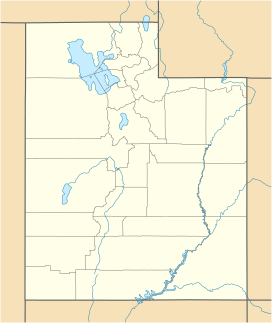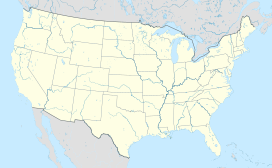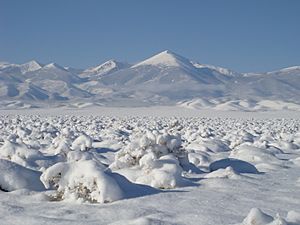Snake Valley (Great Basin) facts for kids
Quick facts for kids Snake Valley |
|
|---|---|
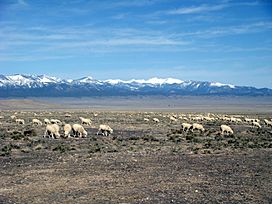
Sheep grazing in southern Snake Valley
|
|
| Long-axis direction | North-South |
| Geography | |
Snake Valley is a long valley that runs from north to south. It sits right on the border between Nevada and Utah in a large area called the Great Basin. Mountains surround the valley: the Snake Range and Deep Creek Mountains are to the west, and the Confusion Range is to the east. Snake Valley is also the main entrance to Great Basin National Park and its famous Lehman Caves. These caves are found in the western part of the valley, within the southern Snake Range.
Contents
People of Snake Valley
Even though Snake Valley feels far away from big cities today, people have lived here for a very long time. We know that humans were present in this area as far back as 12,000 years ago! The oldest proof we can visit is the Baker Archeological Site. This site was once home to the Fremont culture, an ancient group of people. The BLM helps protect this important historical place.
Communities Today
Several small towns and communities are found in Snake Valley. On the Nevada side, you'll find Baker. In Utah, there are towns like Garrison, Burbank, Eskdale, Callao, Partoun, Trout Creek, Gandy, and Border.
What People Do
Today, the main jobs in Snake Valley are farming and ranching. Raising sheep is a very common activity here.
Water in Snake Valley
Snake Valley is special because it has a good amount of water for a desert area. This water comes from snow that falls on the tall mountains nearby, like the Snake Range and Deep Creek Mountains. This snow melts and soaks into the ground, filling up a huge underground water supply called an aquifer.
Why Water is Important
Because of this extra water, Snake Valley has many springs, wetlands, and even lakes. This makes the valley surprisingly green and full of life, even though it's part of the Great Basin Desert. For a long time, this water has attracted both wildlife and farmers. Some farms, like Dearden Ranch in Burbank, Utah, have been running continuously since the 1880s!
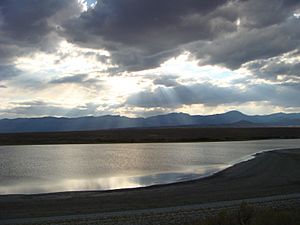
Water Project Proposal
The Southern Nevada Water Authority (SNWA) has suggested a big project to move water from Snake Valley. The SNWA provides water to the Las Vegas area. Their plan is to build a pipeline to pump groundwater from Snake Valley (and another place called Spring Valley). This water would then be sent to Las Vegas for people to use in their homes and businesses. They propose to move a very large amount of water each year.
Concerns About the Project
Many local ranchers and environmental groups are worried about this plan. They are concerned that taking so much water could dry up local springs and affect farming. They compare the situation to Owens Valley, California, where a similar project caused problems in the past.
Because of these concerns, scientists have been studying the water in Snake Valley more closely. The USGS and the Utah Geological Survey have both done studies. These studies generally show that the snow in the high mountains is the source of the large springs in places like Fish Springs National Wildlife Refuge.
Support for the Project
On the other hand, some people support the water project. They believe it is important for the continued growth of the Las Vegas area. Patricia Mulroy, who used to be in charge of the SNWA, has often said that Las Vegas needs this water source to keep going.
Supporters sometimes point to New York City as an example. New York City gets its water from the Catskills and Hudson Valley region. They argue that with careful management, these natural areas can continue to provide water without being harmed.
 | DeHart Hubbard |
 | Wilma Rudolph |
 | Jesse Owens |
 | Jackie Joyner-Kersee |
 | Major Taylor |


